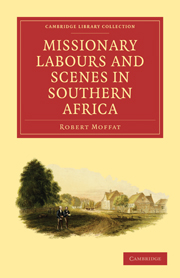Book contents
- Frontmatter
- PREFACE
- Contents
- CHAPTER I
- CHAPTER II
- CHAPTER III
- CHAPTER IV
- CHAPTER V
- CHAPTER VI
- CHAPTER VII
- CHAPTER VIII
- CHAPTER IX
- CHAPTER X
- CHAPTER XI
- CHAPTER XII
- CHAPTER XIII
- CHAPTER XIV
- CHAPTER XV
- CHAPTER XVI
- CHAPTER XVII
- CHAPTER XVIII
- CHAPTER XIX
- CHAPTER XX
- CHAPTER XXI
- CHAPTER XXII
- CHAPTER XXIII
- CHAPTER XXIV
- CHAPTER XXVI
- CHAPTER XXVII
- CHAPTER XXVIII
- CHAPTER XXIX
- CHAPTER XXX
- CHAPTER XXXI
- CHAPTER XXXII
- CHAPTER XXXIII
- CHAPTER XXXIV
- INDEX
CHAPTER III
Published online by Cambridge University Press: 29 August 2010
- Frontmatter
- PREFACE
- Contents
- CHAPTER I
- CHAPTER II
- CHAPTER III
- CHAPTER IV
- CHAPTER V
- CHAPTER VI
- CHAPTER VII
- CHAPTER VIII
- CHAPTER IX
- CHAPTER X
- CHAPTER XI
- CHAPTER XII
- CHAPTER XIII
- CHAPTER XIV
- CHAPTER XV
- CHAPTER XVI
- CHAPTER XVII
- CHAPTER XVIII
- CHAPTER XIX
- CHAPTER XX
- CHAPTER XXI
- CHAPTER XXII
- CHAPTER XXIII
- CHAPTER XXIV
- CHAPTER XXVI
- CHAPTER XXVII
- CHAPTER XXVIII
- CHAPTER XXIX
- CHAPTER XXX
- CHAPTER XXXI
- CHAPTER XXXII
- CHAPTER XXXIII
- CHAPTER XXXIV
- INDEX
Summary
In February, 1801, Dr. Vanderkemp and Mr. Read, with more than 100 Hottentots, left Graaff Reinet. Their temporary residence was appointed at Botha's farm, about seven miles west of Algoa Bay, where they continued with the Hottentots for nearly eight months, leading a life of uninterrupted anxiety, perplexity and danger, the Doctor being for some time confined to his bed with rheumatism. Though liberally assisted with necessaries by government order from Fort Frederick, they were continually exposed to enemies of different descriptions, and but for God's protecting arm must have been destroyed root and branch.
Their institution made them an object of hatred to many of the colonists, who described them as taking part with the plundering Hottentots and Kafirs; and representing their station as a refuge for robbers and murderers; while the truth was, that it was an asylum only for those who had separated themselves from such banditti. Notwithstanding this, a government order, to the great sorrow of the missionaries, prohibited the reception of any Hottentots into this asylum, and those thus repelled, chose to maintain themselves in the woods, among brutes, rather than return to their own tribes. General Dundas, approving of the Doctor's scheme, wished the whole party to remove for safety to the fortress, and, regarding the missionaries as dead men if they did not accept of his offer, proposed to them again, as a last resource for the preservation of their lives, to sail with him to the Cape of Good Hope, and defer the instruction of the Hottentots in that region till a more favourable season; but to this the Doctor would not consent.
- Type
- Chapter
- Information
- Missionary Labours and Scenes in Southern Africa , pp. 34 - 48Publisher: Cambridge University PressPrint publication year: 2010First published in: 1842

